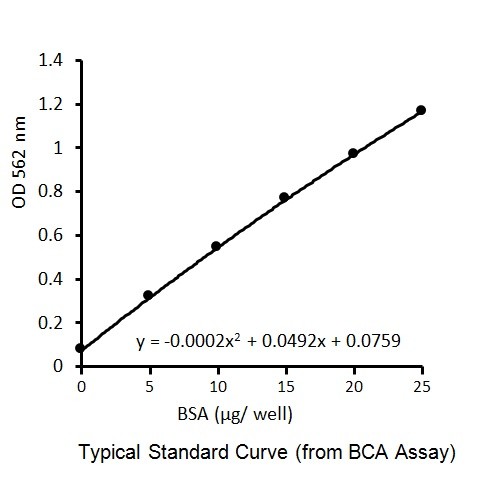Protein Carbonyl Content Assay Kit
Datasheet (PDF) | Safety Data Sheets (MSDS)(PDF)
View All Related Products
Description
Protein carbonyl groups are an important and immediate biomarker of oxidative stress. DNPH tagging of protein carbonyls has been one of the most common measures of oxidative stress. DNP hydrazones formed from the reaction are easily quantifiable at 375 nm. BioVision’s Protein Carbonyl Content Assay Kit is designed to provide a simple and accurate method of quantifying carbonyls in protein samples. Using BSA as an example, a 1 mg (~ 15 nmol) sample has a detection limit of about 0.15 nmol carbonyl, where BSA typically contains approximately 1-3 nmol carbonyl/mg.
Datasheet
| Cat # +Size | K830-100 |
|---|---|
| Size | 100 assays |
| Detection Method | Absorbance ( 375 nm) |
| Species Reactivity | Mammalian |
| Applications | N/A |
| Features & Benefits | • Simple procedure; takes ~ 30-90 minutes |
| Kit Components | DNPH Solution 87% TCA Solution 10% Streptozocin Solution 6 M Guanidine Solution 96-Well Clear Plate |
| Storage Conditions | 4°C |
| Shipping Conditions | Gel Pack |
| USAGE | For Research Use Only! Not For Use in Humans. |
FAQ
Do we need to use two columns for each labeling reaction? If so, do both columns need to go through the steps of VI-C-1 in the protocol? In other words, do we have to wash the resin for the two columns at the same time in one labeling reaction?
Yes, the end user needs two columns for each labeling reaction. This is to get rid of the free Cy5 completely and one column volume of bead is not enough. Yes, two columns must be washed with buffer as described in the datasheet.
Homogenization of tissue is suggested in your protocol using water is not working for us. What would you recommend to homogenize tissues instead?
We recommend using water only as mentioned in the protocol. Additionally, we recommend passing the cell lysate supernatant through 10 kDa spin column (10000 x g, 4 °C, 10 min; BioVision Cat#1997) and retain the filtrate for the assay.
CITATIONS
 We're here to help
We're here to help
Get expert recommendations for common problems or connect directly with an on staff expert for technical assistance related to applications, equipment and general product use.
Contact Tech Support
 High Quality Guaranteed Product
High Quality Guaranteed Product
Our products such as Elisa, Antibodies, Proteins, Peptides and sequencing kits are covered by Biolinkk quality warranty and will work as described in datasheet, a free replacement or money back is guaranteed if does not perform according to datasheet.
Learn More



